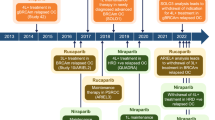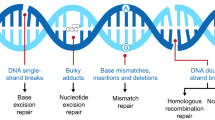Abstract
The identification of new, effective drugs is a pressing need in colorectal cancer (CRC) rescue therapy. Data examining O 6-methylguanine-DNA-methyl transferase (MGMT) and its predictive role in temozolomide (TMZ) treatment in CRC are scarce. In this study, the effect of MGMT status on the cytotoxic sensitivity caused by TMZ was analyzed using cytology proliferation assays in colon cancer cell lines. MGMT protein expression was assessed with immunohistochemistry in 385 patients. Concordance between primary and metastatic sites and the role of MGMT status on survival were statistically analyzed. TMZ sensitivity was significantly affected by the level of MGMT protein expression. Of 385 cases, 13 (3.4 %) demonstrated loss of MGMT expression. However, low MGMT expression levels were significantly more common in signet ring cell carcinomas (p = 0.011). In 111 of 385 cases, the overall concordance of MGMT status between primary tumor and metastatic sites was 66.67 % (κ = 0.271, p < 0.001). The median progression-free survival was significantly different between groups with low or high MGMT expression for the irinotecan-based regimen (p = 0.025), but MGMT protein expression was not observed to be a prognostic factor. In conclusion, MGMT was an important in vitro predictor of TMZ activity in CRC. The rate of MGMT protein loss was low in metastatic CRC patients from China, and MGMT might be more commonly lost in signet ring cell carcinoma. The MGMT status at primary and metastatic sites was consistent, but the power of concordance was poor. Further study into these topics is warranted.




Similar content being viewed by others
References
Van Cutsem E, Kohne CH, Hitre E, Zaluski J, Chang Chien CR, Makhson A, et al. Cetuximab and chemotherapy as initial treatment for metastatic colorectal cancer. N Engl J Med. 2009;360(14):1408–17. doi:10.1056/NEJMoa0805019.
Hurwitz H, Fehrenbacher L, Novotny W, Cartwright T, Hainsworth J, Heim W, et al. Bevacizumab plus irinotecan, fluorouracil, and leucovorin for metastatic colorectal cancer. N Engl J Med. 2004;350(23):2335–42. doi:10.1056/NEJMoa032691.
Saltz LB, Clarke S, Diaz-Rubio E, Scheithauer W, Figer A, Wong R, et al. Bevacizumab in combination with oxaliplatin-based chemotherapy as first-line therapy in metastatic colorectal cancer: a randomized phase III study. J Clin Oncol Off J Am Soc Clin Oncol. 2008;26(12):2013–9. doi:10.1200/JCO.2007.14.9930.
Grothey A, Sugrue MM, Purdie DM, Dong W, Sargent D, Hedrick E, et al. Bevacizumab beyond first progression is associated with prolonged overall survival in metastatic colorectal cancer: results from a large observational cohort study (BRiTE). J Clin Oncol Off J Am Soc Clin Oncol. 2008;26(33):5326–34. doi:10.1200/JCO.2008.16.3212.
Bokemeyer C, Van Cutsem E, Rougier P, Ciardiello F, Heeger S, Schlichting M, et al. Addition of cetuximab to chemotherapy as first-line treatment for KRAS wild-type metastatic colorectal cancer: pooled analysis of the CRYSTAL and OPUS randomised clinical trials. Eur J Cancer. 2012;48(10):1466–75. doi:10.1016/j.ejca.2012.02.057.
Tournigand C, Andre T, Achille E, Lledo G, Flesh M, Mery-Mignard D, et al. FOLFIRI followed by FOLFOX6 or the reverse sequence in advanced colorectal cancer: a randomized GERCOR study. J Clin Oncol Off J Am Soc Clin Oncol. 2004;22(2):229–37. doi:10.1200/JCO.2004.05.113.
Grothey A, Van Cutsem E, Sobrero A, Siena S, Falcone A, Ychou M, et al. Regorafenib monotherapy for previously treated metastatic colorectal cancer (CORRECT): an international, multicentre, randomised, placebo-controlled, phase 3 trial. Lancet. 2013;381(9863):303–12. doi:10.1016/S0140-6736(12)61900-X.
Hegi ME, Diserens AC, Gorlia T, Hamou MF, de Tribolet N, Weller M, et al. MGMT gene silencing and benefit from temozolomide in glioblastoma. N Engl J Med. 2005;352(10):997–1003. doi:10.1056/NEJMoa043331.
Dehdashti AR, Hegi ME, Regli L, Pica A, Stupp R. New trends in the medical management of glioblastoma multiforme: the role of temozolomide chemotherapy. Neurosurg Focus. 2006;20(4):E6. doi:10.3171/foc.2006.20.4.3.
Hegi ME, Liu L, Herman JG, Stupp R, Wick W, Weller M, et al. Correlation of O6-methylguanine methyltransferase (MGMT) promoter methylation with clinical outcomes in glioblastoma and clinical strategies to modulate MGMT activity. J Clin Oncol Off J Am Soc Clin Oncol. 2008;26(25):4189–99. doi:10.1200/JCO.2007.11.5964.
Natarajan AT, Vermeulen S, Darroudi F, Valentine MB, Brent TP, Mitra S, et al. Chromosomal localization of human O6-methylguanine-DNA methyltransferase (MGMT) gene by in situ hybridization. Mutagenesis. 1992;7(1):83–5.
Gerson SL. MGMT: its role in cancer aetiology and cancer therapeutics. Nat Rev Cancer. 2004;4(4):296–307. doi:10.1038/nrc1319.
Shacham-Shmueli E, Beny A, Geva R, Blachar A, Figer A, Aderka D. Response to temozolomide in patients with metastatic colorectal cancer with loss of MGMT expression: a new approach in the era of personalized medicine? J Clin Oncol Off J Am Soc Clin Oncol. 2011;29(10):e262–5. doi:10.1200/JCO.2010.32.0242.
Dolan ME, Moschel RC, Pegg AE. Depletion of mammalian O6-alkylguanine-DNA alkyltransferase activity by O6-benzylguanine provides a means to evaluate the role of this protein in protection against carcinogenic and therapeutic alkylating agents. Proc Natl Acad Sci U S A. 1990;87(14):5368–72.
Dolan ME, Mitchell RB, Mummert C, Moschel RC, Pegg AE. Effect of O6-benzylguanine analogues on sensitivity of human tumor cells to the cytotoxic effects of alkylating agents. Cancer Res. 1991;51(13):3367–72.
Jones PA. Altering gene expression with 5-azacytidine. Cell. 1985;40(3):485–6.
Taylor SM, Constantinides PA, Jones PA. 5-Azacytidine, DNA methylation, and differentiation. Curr Top Microbiol Immunol. 1984;108:115–27.
Glover AB, Leyland-Jones B. Biochemistry of azacitidine: a review. Cancer Treat Rep. 1987;71(10):959–64.
Nagasaka T, Goel A, Notohara K, Takahata T, Sasamoto H, Uchida T, et al. Methylation pattern of the O6-methylguanine-DNA methyltransferase gene in colon during progressive colorectal tumorigenesis. Int J Cancer J Int Cancer. 2008;122(11):2429–36. doi:10.1002/ijc.23398.
Braun MS, Richman SD, Quirke P, Daly C, Adlard JW, Elliott F, et al. Predictive biomarkers of chemotherapy efficacy in colorectal cancer: results from the UK MRC FOCUS trial. J Clin Oncol Off J Am Soc Clin Oncol. 2008;26(16):2690–8. doi:10.1200/JCO.2007.15.5580.
Herman JG, Graff JR, Myohanen S, Nelkin BD, Baylin SB. Methylation-specific PCR: a novel PCR assay for methylation status of CpG islands. Proc Natl Acad Sci U S A. 1996;93(18):9821–6.
Stupp R, Hegi ME, Mason WP, van den Bent MJ, Taphoorn MJ, Janzer RC, et al. Effects of radiotherapy with concomitant and adjuvant temozolomide versus radiotherapy alone on survival in glioblastoma in a randomised phase III study: 5-year analysis of the EORTC-NCIC trial. Lancet Oncol. 2009;10(5):459–66. doi:10.1016/S1470-2045(09)70025-7.
Ferguson AT, Lapidus RG, Baylin SB, Davidson NE. Demethylation of the estrogen receptor gene in estrogen receptor-negative breast cancer cells can reactivate estrogen receptor gene expression. Cancer Res. 1995;55(11):2279–83.
Shima K, Morikawa T, Baba Y, Nosho K, Suzuki M, Yamauchi M, et al. MGMT promoter methylation, loss of expression and prognosis in 855 colorectal cancers. Cancer Causes Control CCC. 2011;22(2):301–9. doi:10.1007/s10552-010-9698-z.
Kakar S, Deng G, Smyrk TC, Cun L, Sahai V, Kim YS. Loss of heterozygosity, aberrant methylation, BRAF mutation and KRAS mutation in colorectal signet ring cell carcinoma. Mod Pathol Off J US Can Acad Pathol Inc. 2012;25(7):1040–7. doi:10.1038/modpathol.2012.44.
Shen L, Kondo Y, Rosner GL, Xiao L, Hernandez NS, Vilaythong J, et al. MGMT promoter methylation and field defect in sporadic colorectal cancer. J Natl Cancer Inst. 2005;97(18):1330–8. doi:10.1093/jnci/dji275.
Whitehall VL, Walsh MD, Young J, Leggett BA, Jass JR. Methylation of O-6-methylguanine DNA methyltransferase characterizes a subset of colorectal cancer with low-level DNA microsatellite instability. Cancer Res. 2001;61(3):827–30.
Okamoto R, Takano H, Okamura T, Park JS, Tanimoto K, Sekikawa T, et al. O(6)-methylguanine-DNA methyltransferase (MGMT) as a determinant of resistance to camptothecin derivatives. Japanese J Cancer Res Gann. 2002;93(1):93–102.
Kuo CC, Liu JF, Chang JY. DNA repair enzyme, O6-methylguanine DNA methyltransferase, modulates cytotoxicity of camptothecin-derived topoisomerase I inhibitors. J Pharmacol Exp Ther. 2006;316(2):946–54. doi:10.1124/jpet.105.095919.
Author information
Authors and Affiliations
Corresponding author
Ethics declarations
All of the procedures performed in the study involving human participants were in accordance with the ethical standards of the institutional and national research committee and with the 1964 Helsinki Declaration and its later amendments. Informed consent was obtained from each participant included in the study.
Conflicts of interest
None.
Additional information
Le Zhang and Jing Zeng contributed equally to this work.
Rights and permissions
About this article
Cite this article
Zhang, L., Zeng, J., Zeng, Z. et al. MGMT in colorectal cancer: a promising component of personalized treatment. Tumor Biol. 37, 11443–11456 (2016). https://doi.org/10.1007/s13277-016-5014-1
Received:
Accepted:
Published:
Issue Date:
DOI: https://doi.org/10.1007/s13277-016-5014-1




